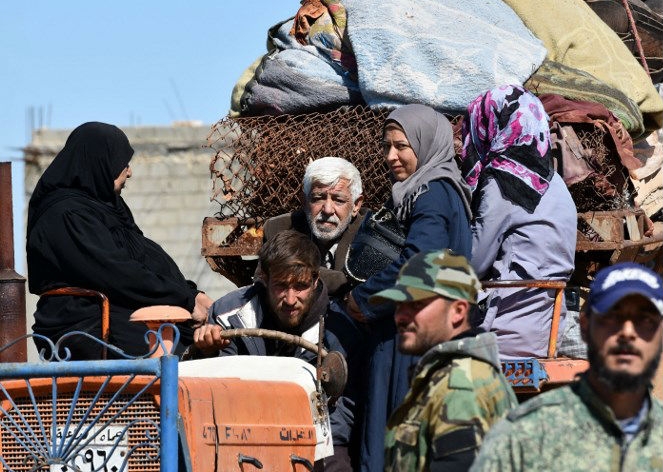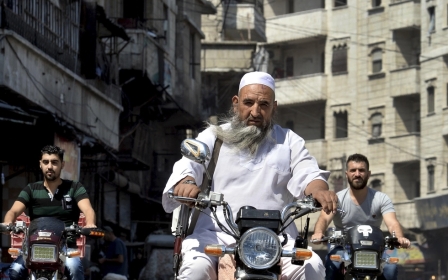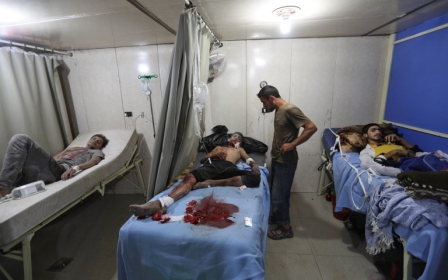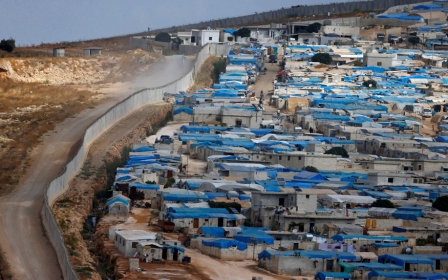Fears for Idlib as UN says 38,500 have fled Syrian province in past fortnight

Violence in northwest Syria has displaced more than 38,500 people in less than two weeks amid increasing hostilities and a looming regime assault on the opposition-held Idlib province, the UN has said.
Thursday's announcement marks a hike of nearly 10,000 people from the figure the UN provided on Monday.
"Between 1-12 September, available information indicates that a sharp increase in hostilities and fears of further escalation has led to the displacement of over 38,500 people," the UN humanitarian agency (OCHA) said.
However, OCHA said that 4,500 of those who had fled since 1 September had "spontaneously returned" over the past three days amid a relative decrease in hostilities in western and southern rural parts of Idlib province.
The province and adjacent rural areas form the largest piece of territory still held by Syria's beleaguered rebels, worn down by a succession of government victories in recent months.
President Bashar al-Assad has now set his sights on Idlib, and at the beginning of the month his forces and their Russian allies stepped up their bombardment of the densely populated province.
Some three million people live in the zone now, about half of them already displaced by the brutal seven-year war and others heavily dependent on humanitarian aid to survive.
A major military operation in Idlib is expected to pose a humanitarian nightmare because there is no nearby opposition territory left in Syria where people could be evacuated to.
"We are in no way ready for the worst-case scenario, should we see three million of the people headed to the Turkish border," the UN's Regional Humanitarian Coordinator for the Syria Crisis, Panos Moumtzis, told reporters in Geneva.
"A key element of course is that at the moment as humanitarians while we hope for the best, we are preparing for the worst," he said, adding that the UN has created a preparedness plan.
"We're looking at a response for up to 900,000 people that may flee... We hope it won't happen. We hope it will not be needed.
"In no way am I saying we are ready. What is important is that we are doing our maximum to ensure a level of readiness."
Moumtzis said the UN had shared the GPS coordinates of 235 protected sites in Idlib, including schools and hospitals, with Russia, Turkey and the US-led coalition amid fears of the assault.
French foreign minister Jean-Yves Le Drian warned in Beijing on Thursday that any chemical weapons attack on Idlib would lead to "consequences" for the regime in Damascus.
Speaking at a joint news conference with his Chinese counterpart Wang Yi, Le Drian said the use of chemical weapons in the assault would prompt a response from Paris.
"France warns against the use of chemical weapons," he said, calling it a "red line".
The regime and Russia have consistently denied accusations of the use of chemical weapons, blaming opposition fighters instead.
But international investigators have found that on at least three occasions the regime unleashed chemical weapons on civilians, while the Islamic State was also blamed for using mustard gas.
Turkish military deployments
Meanwhile, Turkey is reinforcing its military posts inside Idlib after President Recep Tayyip Erdogan failed to win a pledge of ceasefire from the presidents of Russia and Iran at a meeting in Tehran on Friday.
Three Turkish security and government officials told the Reuters news agency that troops, armoured vehicles and equipment had been sent to the Syrian border.
A senior security source said the army had reinforced 12 Turkish military posts that ring Idlib.
"We have a military presence there and if that military presence is damaged or attacked in any way, it would be considered an attack on Turkey and would therefore receive the necessary retaliation," the source said.
Turkey deployed hundreds of its soldiers to the 12 observation posts following a de-escalation agreement reached with Russia and Iran last year to freeze the lines of the conflict, effectively placing Ankara as a protector of the province.
Three similar zones, on Syria's southern border with Jordan, to the east and to the north of Damascus, have since been recaptured by the Syrian army and its allies.
A senior Syrian rebel said Turkey had sent dozens of armoured vehicles and tanks, as well as hundreds of special forces personnel to Idlib, a move he said showed Idlib would not share the fate of the other rebel regions.
"There are very big reinforcements of Turkish forces inside Syria and these observation posts have now in effect become permanent military bases," Mustafa Sejari said.
Rebel sources told Reuters that Turkey has also stepped up supplies to the rebel forces in Idlib in recent days, including ammunition and rockets.
The Syrian Observatory for Human Rights, a UK-based activist group, also said on Thursday that a Turkish convoy entered from the Kfar Lusin crossing in northern Idlib, heading to some of the 12 Turkish observations posts.
A video shot by activists from the monitoring group Central Station for Turkish Intervention showed armoured and gun-mounted vehicles and tanks driving through an Idlib road.
Both said the convoy was heading to two different observation points, one south of Idlib and another in the centre, the AP news agency reported.
The Turkish military did not immediately respond to request for comment.
Hulusi Akar, the Turkish defense minister, said late on Wednesday that a military operation in the densely populated rebel enclave would drag the already problematic region toward disaster.
He spoke during a meeting with foreign ambassadors, according to the state-run Turkish Anadolu Agency.
"We are working with Russia, Iran and other allies to bring peace and stability and to stop a humanitarian tragedy," Akar said, according to Anadolu.
New MEE newsletter: Jerusalem Dispatch
Sign up to get the latest insights and analysis on Israel-Palestine, alongside Turkey Unpacked and other MEE newsletters
Middle East Eye delivers independent and unrivalled coverage and analysis of the Middle East, North Africa and beyond. To learn more about republishing this content and the associated fees, please fill out this form. More about MEE can be found here.




